#it’s so interesting
Explore tagged Tumblr posts
Text
today in my science class my teacher told me the story of one time when they were dissecting frogs, they found one with a very inflated stomach, and expected it to be a female with eggs inside, but they cut it open to find a whole scorpion (dead of course) which was fully intact and i just think that’s very cool

everything eats and is eaten
#i love biology#it’s so interesting#life and death are so intriguing#anyway thanks for listening to me yap
5K notes
·
View notes
Text






Displaced Windows
ig: cheri.png
#I’ve been collecting these for a while#it’s so interesting#one of my fav genre#old internet#old web#00s#y2k#2000s#cyber y2k#cybercore#moodboard#cyber core#tech#windows#displaced software#displaced windows#old windows#windows 95#windows xp#techcore#y2k aesthetic#windows 98
2K notes
·
View notes
Text
can we talk about the almost complete lack of religion in the hunger games? i find it SO incredibly interesting, and i never thought much of it. i always thought it made sense that religion would die with our world. but then in tbosas, we have the breadcrumbs. the ritual from district 2. and it makes me wonder, whether that spun from something from the old world. or whether mankind created something entirely new, and whether there was more to it that mrs. plinth chose not to tell coriolanus.
165 notes
·
View notes
Text
Within the collector’s “The X-Files: The Official Archives” is gathered a scrappy timeline with years and months outlined, specifically revolving seasons 5-6. One thing I’ve always found interesting is that it also includes information on when the X-Files were in the care of Jeffrey Spender and Diana Fowley. Interestingly enough, it documents that during the episode “Agua Mala” (S6E13), Spender and Fowley were the residing figures over the X-Files, which is riveting considering that the episode takes place directly after “One Son”. Obviously, Spender could’ve been documented as still a part of the X-Files even after his death; however, a few pages before this primary document, a future date surrounding the episode “Tithonus” (S6E10) is illustrated, meaning that the episodes are not technically in chronological order. So, therefore, i like to believe that “Agua Mala” does canonically take place before “One Son”, meaning there are episodes where, though he’s not mentioned whatsoever, Jeffrey was still alive 👍👍
Hopefully in the next volume, we actually get dates to important episodes like “One Son”, “Patient X”, “The End”, and more, because we can only deduce so much from sporadic and hidden dates.


Maybe everyone’s already aware of all of this, but it really fascinates me bro 🙏
#txf#the x files#x files#jeffrey spender#diana fowley#fox mulder#dana scully#walter skinner#books#my screenshots#my canon#headcanons#i love this book so much#it’s so interesting#all of the information in the nooks and crannies of it#I can’t wait for the sequel#because I need jeffrey to be mentioned since it’s going to include the syndicate information#but they keep postponing the release date bro#🙏#😭
41 notes
·
View notes
Text
It always itches my brain when I see players in a tense convo arranging their inventory to be ready for combat if it happens
Idk how much others do it but pangi does it a lot
29 notes
·
View notes
Text
Doctor Who as a Post-Colonial Metaphor
Recently I've been thinking a lot about how beautifully Doctor Who reflects the state of post-colonial British identity, and tumblr seems like the appropriate place to share my ramblings. So let’s see if I can explain in a way that makes sense.
I must start by putting on my obnoxious little film degree hat and reminding everyone that sci-fi is one of those genres that is highly political (as most things are, but scifi even moreso). It turns out it's pretty easy to get a sense of people's fears and anxieties by asking them to envision the future, and that's what sci-fi media does; it uses contemporary cultural standards and ideas to create a vision of what futuristic/advanced science and technology might look like, and how people might respond to it. In doing so, it ends up taking the social and political temperature of the time and place in which it's created.
As such, it's very, very common for scholars to analyze sci-fi media through this lens; even Frankenstein, arguably the first science fiction novel ever written, is often interpreted as reflecting cultural fears regarding swiftly advancing science and technology during the early stages of the industrial revolution. The Day The Earth Stood Still (1951) is another great, very blatant example of how sci-fi and politics can interact. In this movie, a Jesus-like alien ascends to Earth during the Cold War to warn the human race about their imminent nuclear annihilation. It seems corny to us now, but it's actually a great movie and I would highly reccomend it. It's rumored that the US Department of Defense read the script and Did Not Like It because the themes were too anti-war.
In other words, despite often being viewed as too “pop,” too goofy, and too unserious to have any deep meaning, pretty much any scifi story can be analyzed within an inch of its life using a meta social/political lens. It's not the only way to interpret sci-fi, but it's by far the most common. One must simply ask, “what does this vision of science, technology, and/or the future say about us as we are now?”
But anyway. Doctor Who. Disclaimer: I haven't watched the classic series so I'll focus on 2005 onward (still post-colonial so it still holds up, lol). If you've seen Classic and you'd like to chip in, please do.
Genre-wise, Doctor Who is more-or-less a space-western, a subgenre of sci-fi that incorporates Western elements—exploring new frontiers, engaging with unfamiliar civilizations, rogue figures, etc. Star Trek is the peak example of this, but there are many, many others.
Of course, the Western genre is dripping with colonialism due to its historical setting of the American West, and the racist depictions of Indigenous peoples. Space-westerns, consequently, also tend to address colonial topics. Sometimes space westerns are just as racist as normal westerns, but sometimes they use the genre reflexively, to question colonial ideals. A more progressive space-western might be more willing to “humanize” the alien cultures they meet, asking questions like, "how does one ethically engage with foreign societies?" or "When is it appropriate to intervene in a conflict?" etc.
Althought these kinds of questions come up regularly in Doctor Who, especially regarding its anti-war messaging (Time War etc.). These themes become doubly interesting when you use them to inform your interpretation of The Doctor, both as a character and as a symbol.
Consider this: The Doctor is the embodiment of an ancient and immensely powerful being with a bloody history. Their kill-count is quite literally somewhere in the quadrillions. Although they are a self-proclaimed pacifist, they are still constantly a perpetrator of death and destruction throughout the series. The Doctor, despite repeatedly and loudly choosing peace, can never seem to keep their hands clean of chaos and suffering. Doctor Who is about an entity that destroys everything they touch, sometimes on purpose, sometimes not. As an allegory for grappling with the legacy of British imperialism, I'd say it's pretty on the nose.
In this sense, not only is Doctor Who a show about colonialism, it is also a show about identity in the wake of colonialism. It's even in the name: "Doctor Who?" Who is the Doctor? What is their responsibility to the universe? What does it mean to be ancient and powerful and drenched in the blood of millions? How do they move on, become better, without falling into the same traps? What does it mean to be British?
These questions come up over and over throughout the new series, from the destruction of Gallifrey, to the Timelord Victorious, to A Good Man Goes to War, the Flux (arguably), and many, many other smaller plotlines I could mention. Even in the latest series with Ncuti Gatwa, the focus on adoption and family is in a similar vein—where does the Doctor come from? What does it even mean to be “from” a place? How much do your origins truly contribute to who you are and who you become?
How the companions fall within this framework is also interesting; if the Doctor is a stand-in for the nation as an entity, then the Doctor's companion, the everyday British person, is the stand-in for the populace. The companions are ever-changing, ever-evolving, constantly renegotiating their relationship with the Doctor. The companion's ultimate challenge is to find how they fit into the narrative of the Doctor's life, and try their best to come out the other end with a happy ending (ha).
Of course, Doctor Who is owned by the BBC, meaning it is quite literally nationally subsudized TV. As a result, althought the show is actually VERY critical in some places, the Doctor is usually ultimately sympathetic; their good intentions tend to forgive a lot of the problems they've caused. The companion is usually charmed by the Doctors' seemingly endless tragedy of a life. This is a country's state-owned media company working with it's own self-image--it's inherently a work of self-reflection, and perhaps of self-obsession, too.
It would be easy to be cynical about Doctor Who as a product of the BBC, which is state-funded (but notably not owned or directly controlled by the government!). However, I tend to think that just writing it off as propaganda because of this is doing the show a disservice. Yes, there is an inherent privilege and self-centeredness to endlessly forgiving the Doctor, but that's also kind of the whole point; it's a show about coming to terms with one's horrible past. It's a show about learning to formulate a new sense of self. To demand that Doctor Who to be less self-obsessed, to not be about British identity when it is in fact a British show for Brits about Brits, is just a bit unrealistic.
Instead, I choose to believe that Doctor Who can and does use its privilege for good more often than not. The creators tend to be very progressive (as sci-fi so often is) and they can get away with a lot of very progressive messages in the guise of a silly sci-fi show for families. Most recently, I would point to s14e3: Boom, s14e5: Dot and Bubble as examples of thinly veiled rants about the evils of capitalism, war, racism, social media, etc. To ignore or dismiss Doctor Who because it has some form of institutional backing would be doing the actual stories and writers a disservice.
Finally, let me leave you with one last point; One consistancy throughout the new series that I find very charming is the positive effect the companions always have on the Doctor. Companions come and go, which is sad, but they're each special in their own little way, and they each change the Doctor, wearing them down a little at a time. The Doctor is consistently at their worst when they are alone, removed from the people that make them want to be better.
Very often the companion's parting message for the Doctor is "don't be alone.” This can be extrapolated to mean: don't forget we exist. Don't forget to be kind. Even if you can't help your legacy, even if you can't wash the blood off your hands, you can always keep striving to be better. Keep someone around to remind you to be better. And the Doctor, more often than not, does. Because ultimately it is the companions, us the people, that make the Doctor who they are.
It’s this special brand of relentless optimism, this indomitable belief in the goodness of people and the power of that goodness that always brings me back to Doctor Who, one way or another, despite all its flaws.
Edit 11/29: corrected some info about the BBC per the comments!
#once again pls classic fans chip in#I know I missed some points#and it could use editing expanding etc#but this is the gist of it#I just need to get it out#I love Doctor who 🥲#and I love sci-fi as a field#it’s so interesting#I wrote a college paper about bill and Ted’s excellent adventure it was great#doctor who#Peter capaldi#Matt smith#David tennant#jodie whittaker#chris eccleston#ncuti gatwa#RTD#russel t davies#steven moffat#chris chibnall#film analysis#media analysis#essays#essay#media criticism#colonialism#post colonialism#post colonial#media rants#my stuff
34 notes
·
View notes
Text
I am sooo 19th century churching ignorant. Every once in a while in the Anne series, all throughout the series, there’ll be these tiny mentions of certain families and ‘their’ pews in church.
But as Anne sat in the Green Gables pew, on the first Sunday after her return…
Anne of the Island by Lucy Maud Montgomery
Or
When Billy, beaming with pride and happiness, showed his be-plumed and be-silked bride into the Harmon Andrews’ pew, Anne dropped her lids to hide her dancing eyes.
Anne of the Island by Lucy Maud Montgomery
And for me, I guess I always took this as… not exactly assigned seating but definitely as people being creatures of habit and having a ‘usual’ or preferred spot at church. Then today I found out parishioners paid for designated pews back in those days (the closer to the pulpit the more expensive, the further back the less expensive; very much real estate-y class system), as means to raise income for the church.
And now I want to see a full seating chart of who-was-sitting-where both in Avonlea and in the Glen.
Just because I’m pretty much nosey.
How far up were the Blythes in Four Winds? Do you have to stick with your pew, once you’ve chosen it? Is the lease month to month? What about changes of circumstances? Was there any strategic planning in pew placement? Like was one day Susan all, “this won’t do… we have to move up two rows so Jem will stop making faces at Bertie during prayer”? What if you’re Mrs Rachel and you have ten children? Do you have to purchase two pews or is the price per family, no matter how large?
Who sat in front in Avonlea? The Barry’s?
#very curious#anyway#there’s a whole post to someday try to write up about church as a social structure that’s even heavily lended to in maud’s journals#high status organists for instance lol#it’s so interesting
99 notes
·
View notes
Text
think i need to do an essay on queer representation in audio dramas cause it’s so special to me
40 notes
·
View notes
Text
James McAvoy for SHARP Magazine






Photography: Erik Carter
#james mcavoy#this man omg#James McAvoy Talks ‘Speak No Evil’ Finding Stories & Switching Genres#it’s so interesting
27 notes
·
View notes
Text
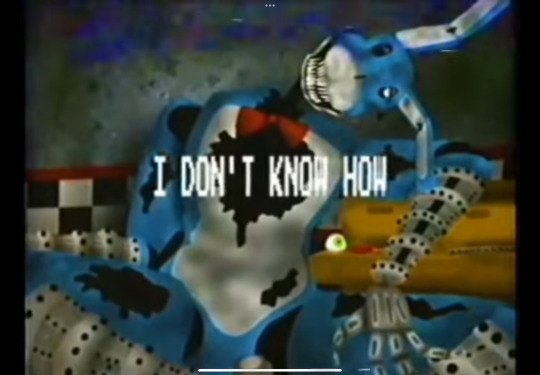

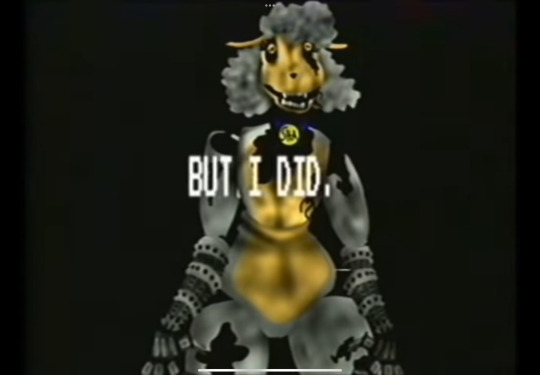
What’s the consensus on these lines because they are so….interesting now, ok?
#who was bon#how could any of this have ever been accidental#it’s so interesting#twf#the walten files#bon twf#twf bon#“bon”#“bon” twf
83 notes
·
View notes
Text
if loving chemistry as a class and subject is wrong, i don’t want to be right :(
#everyone in my class hates chem#i love it so much#it’s so interesting#shut up neil of course you like chem hello 😭#rambling on and on
31 notes
·
View notes
Text
(Characters not ccs and not negative just an observation XD)
I find this so interesting because this is the second time Forever has accused bbh of a crime with zero evidence then proceeded to treat him as guilty and punish him for it.
First with the furniture in which it makes ZERO sense for bbh to steal it when all that would do is make everyone on the island want to outlaw furniture theft even more - plus he has an alibi as Tallulah/Chayann’s room was untouched and bbh has access. It was such an obvious frame. Forever to this day believes that Bad is guilty (I think? Either that or he’s just being petty about previous theft)
Now with the gun and Bad also has an alibi! Foolish literally broke into the vault and posted a picture of himself in the vault with the suitcases. He could have unlocked Forever’s case and taken the gun and that is 100% something Foolish would do! He stole two of the suitcases it’s 100% plausible he could have stolen the gun before bbh ever even had the suitcase. The fact that Forever immediately accuses bad even tho there is a much more viable (if equally innocent) culprit is telling
It’s both interesting with which the speed and resoluteness Forever blames Bad and the fact that… bbh doesn’t do these kinds of pranks.
Bad will steal valuable items from people then give it back after ten minutes of taunting. Hell steal a piece of furniture or two every once in a while but never steals in bulk and has resisted important pieces of furniture many times - looking at you blue chair in front of Max’s house. His pranks are harmless and if it does unintended harm, he’ll repay the victim ten fold.
The magma cube prank didn’t do any irreparable harm and mostly just gave everyone a heart attack and a moment of annoyance before either killing it or capturing it again. When he tormented Bagi with the cube, he upgraded her frying pan with op enchantments as compensation.
The fact that Forever doubles down on bbh being guilty for the furniture and the gun just goes to show how little he actually knows Bad. He thinks he knows Bad enough to tell these are his pranks but he’s just proving how little he actually knows him and it’s so interesting to me
(Edit: I’ve been informed that forever doesn’t actually think bad stole the furniture or has his gun but that kinda makes it worse cuz Forever treats bad like he’s guilty anyway when he knows he’s not XD never change Forever, keep feeding us the drama u little rapscallion)
#qsmp#crimson speaks#badboyhalo#forever#their relationship is so fascinating to me#both of them always see the worst in each other#but they still care so much#and -bad at least - always gives forever the benefit of the doubt#he might get frustrated and hate that forever is President#but at the end of the day he always gives forever the benefit of the doubt#that he’s doing his best#from bbh’s pov#it looks like forever does the opposite#which is INTERESTING#and idk if it’s accurate from Forever’s pov#just like forever mains probably don’t know bbh has so much faith in forever#the biases of perspective#it’s so interesting
120 notes
·
View notes
Text
One of my favorite thing the more supernatural adaptations of Jekyll & Hyde do is debate whether Jekyll/Hyde should be considered a monster. Like, he doesn’t have that immediate classic monster recognition that others like frankenstein’s creature has, but obviously Hyde is quite monstrous. But Hyde is also an inherent part of every human. And he looks human, usually, so not everyone who meets him really clocks him as a monster. I mean, is a man who can turn into another man a monster? What if they don’t even look any different? What exactly puts them in the monster category?
#jekyll and hyde#itv jekyll and hyde#monster high#<- these adaptions specifically inspiring this post#itv when Hyde is talking to Ravi and identifies as ‘your brother the monster’#and the way Jekyll is never sure whether he should be considered a monster#I mean he also grew up thinking he was 100% human!!#which leads me to monster high with Jackson who grows up thinking he’s human#now mh obviously has a kind of different Vibe when it identifies monsters (as in it’s a positive thing for Jackson to strive to identify as)#but it’s really interesting how most other characters only consider the Holt half a monster#I mean it helps that he’s part fire elemental or whatever. if he still looked human as holt would they think differently?#it’s so interesting
45 notes
·
View notes
Text
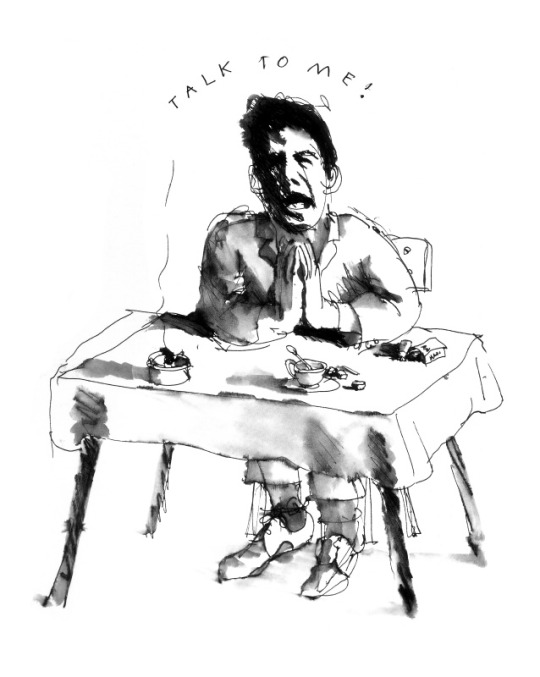
“Funnily enough, Paul has turned out the real black sheep of the whole trip. Everybody hates him and I only feel sorry for him.” — Stuart Sutcliffe in a letter to Rod Murray, late 1960.
Drawing by Klaus Voormann.
#just reread this quote in norman’s biography#it’s so interesting#paul was still an outcast at this point it seems#only tolerated because of his passion and vision for the band#i have no doubt that stuart was exaggerating for effect however#paul mccartney#stuart sutcliffe#klaus voormann#the beatles#1960#quotes#philip norman
248 notes
·
View notes
Text
Highlights from the TLK reddit sub I found



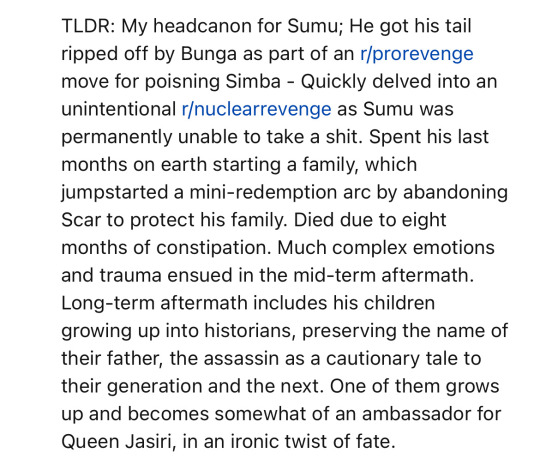


Shit I wish I found this sub sooner. I would’ve gone off on my headcanons. Also him being a genuis AND friends with Ushari????? LIKE YES! I’d love to see a trio with Ushari, Kenge, and Sumu. That’s a squad right there
People are killing him off and meanwhile I made him a misunderstood introverted mama’s boy

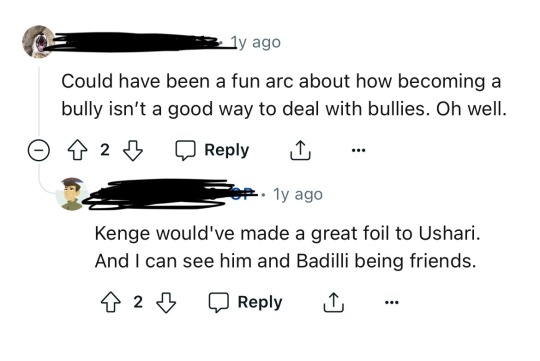

Kenge and Badili is a duo I never thought about but now I want. It’d be very interesting cuz they did the opposite of what the other did after getting bullied. It’d be cute for Kenge to make a new friend!

It’d funny cuz I have the gay version of this with my crack Hodari x Njano au but the idea of Shupavu and Kinyonga being exes is freaking hilarious to me 😭
#i love this sub so much now#it’s so interesting#i was up until after midnight looking at this shit#the lion guard#reddit
35 notes
·
View notes